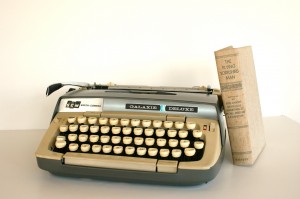 I own an old manual typewriter, similar to what you might see when visiting the Smithsonian Museum in Washington D.C. Weighing at least 10 pounds, it comes in its own grey/green carrying case, proudly baring the name, Smith-Corona on a black and chrome nameplate. Inside is a beautiful instrument of mechanical artwork, operated solely by using the knowledge and creativity stored inside the human brain, and the strength of a pounding finger or two. For a writer going into battle against a stubborn book, it can be a brutal as the axe, or subtle as a fine blade. It doesn’t need a wall plug, internet or IT technician to operate, yet its simplicity is vastly outgunned in speed, agility, and brainpower of a modern computer. The typewriter is a beautiful metaphor to life.
I own an old manual typewriter, similar to what you might see when visiting the Smithsonian Museum in Washington D.C. Weighing at least 10 pounds, it comes in its own grey/green carrying case, proudly baring the name, Smith-Corona on a black and chrome nameplate. Inside is a beautiful instrument of mechanical artwork, operated solely by using the knowledge and creativity stored inside the human brain, and the strength of a pounding finger or two. For a writer going into battle against a stubborn book, it can be a brutal as the axe, or subtle as a fine blade. It doesn’t need a wall plug, internet or IT technician to operate, yet its simplicity is vastly outgunned in speed, agility, and brainpower of a modern computer. The typewriter is a beautiful metaphor to life.
Our life story is an autobiography penned daily, filled with heroes and heroines, plots, sub-plots, and long stretches of supposed boredom with intermittent paragraphs of excitement, romance, or sadness. Each page stands alone. We may think today is connected to yesterday, separated by a brief rest period, but in reality the choices for today’s life story are completely independent from any other day or night. We are free to choose our own plot-line, prose, and genre. Today’s story starts as a blank page; we wake up and begin writing
What is often most difficult is having writers block; today, what story do we want the words on the page to tell? With so many options available; too many choices can become no choice at all, and if we do not make a choice about today the world will make it for us. And the world is often not on our side. Do we need joy today? Excitement? Love? Compassion? Peace? Healing? Pleasure? Rest? Forgiveness? Likely, the truth is that we all need all of these actions today, and maybe more.
On a typewriter, as in life, once the word is on the page it becomes very difficult to remove it; not impossible, but definitely not an easy task. So choosing our words and actions for today becomes vital to obtaining the desired outcome (Love, Peace, Pleasure..), to tell your story. If I need to feel healthy today, then perhaps I need to exercise and eat the proper foods. If I need forgiveness today; then ask yourself, have I forgiven first? Do I love, so it is easier for me to be loved? It takes work to press the keys of a manual typewriter in order to create a legible word on the paper. The saying, “pounding out a story” owes its origin to the manual typewriter. Likewise, it usually takes effort to realize the dream we have for today. That is precisely why I respect my old typewriter; the result on the page at the end of the day did not come easy – I had to work hard for them. I wasn’t working alone either, I have family and friends who help me tell the best story each day; they are my co-authors, as I hope to be theirs. Some of the best outcomes, however, were free to me.
The emotional and physical feedback that we need to sustain our humanity requires our investment and continued effort to be successful. If we stop investing, then our return dwindles until the love, patience and kindness directed from the world back to us can hardly be felt. Although sometimes when we are putting forth all the positive words and actions seemingly required making todays story a great one, the words don’t find the page. We did everything right yet the return cannot be found, a reality of the worlds’ influence on our story.
That is why many years ago I made a single investment by writing a story for God that asks for His love and support, and pledges my dedication (however flawed) to Him. We only have to ask once and God will honor our request forevermore, so I do my best to give Him everything He deserves. Before I wake each day, He has already finished His portion of my story. He knows the best direction my story should take and he influences the actions of every person, place or thing in my path to help my story be the best for me. He writes the paragraph on peace, He inserts the forgiveness in my day, and He shows me how to reach the brass ring when I find myself moving in an endless circle. A better storyteller there can never be.
When writing, if the foundation is solid and the narrative is simple, yet believable, then the story is likely to be a good one. Today, write yourself a great story by placing God in the first sentence.
